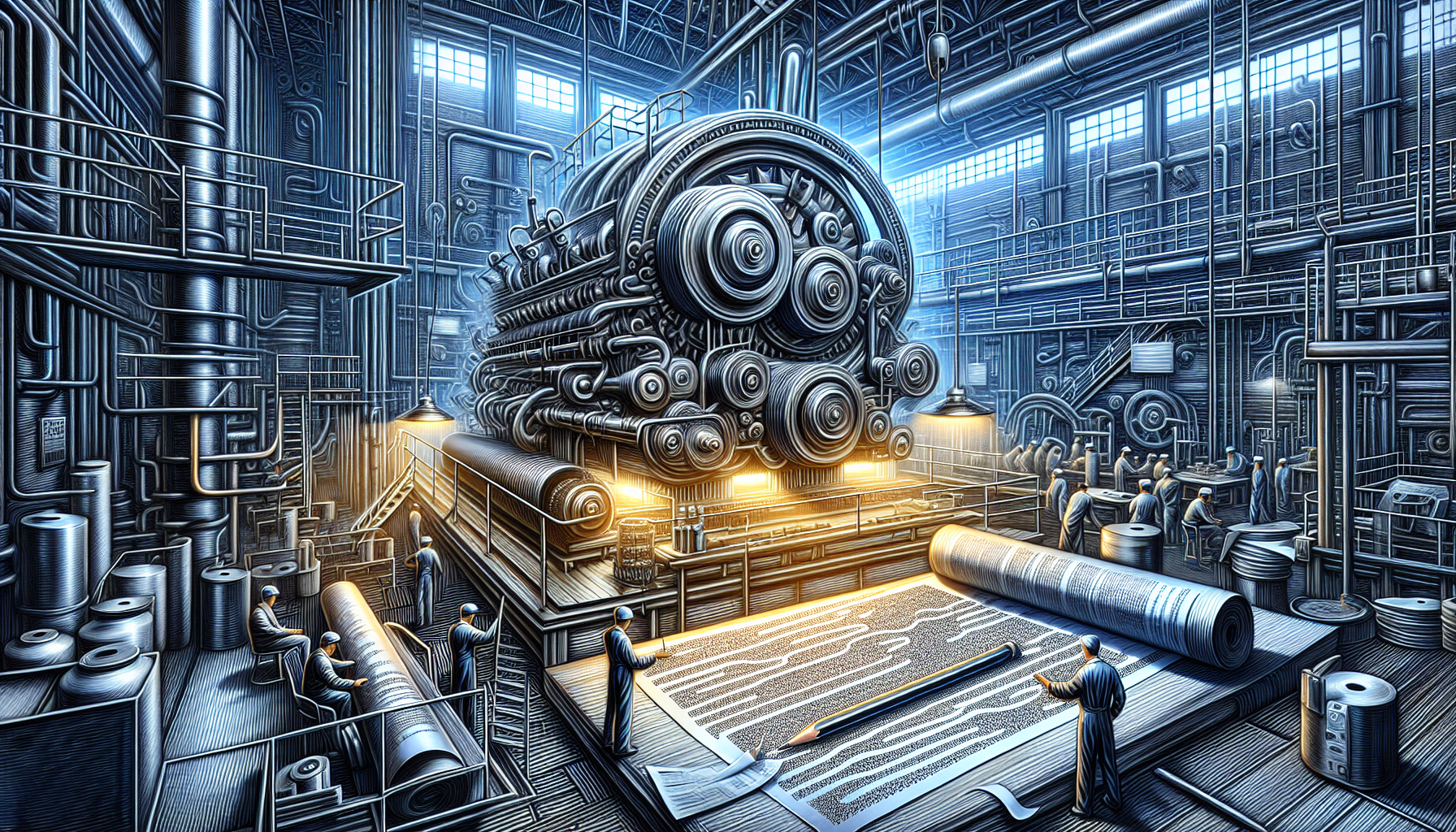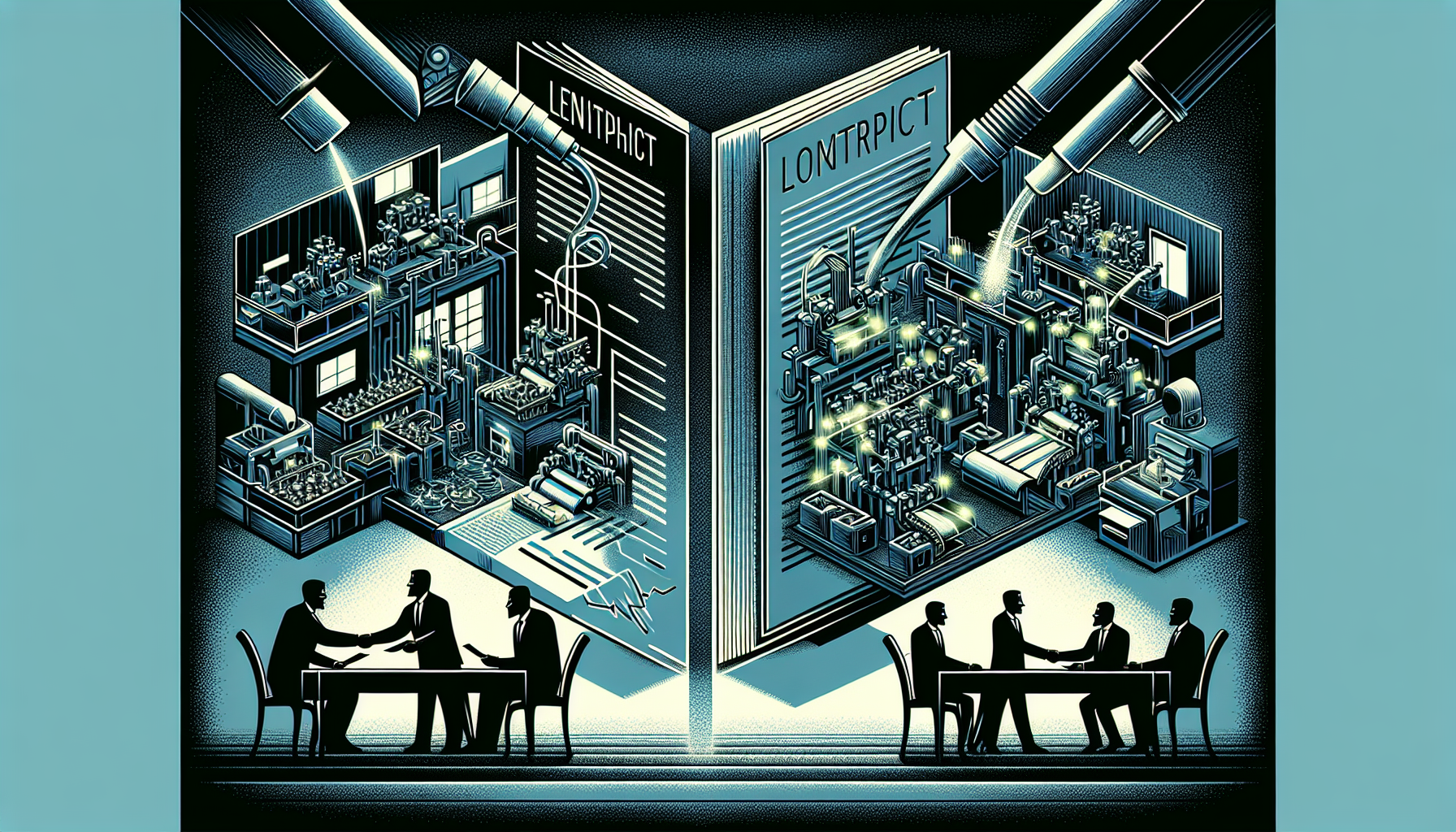Short Answer:
The legal manufacturer plays a pivotal role in ensuring compliance across a product’s lifecycle; assuming responsibility for product design, quality, and safety. This is critical for navigating the complexities of manufacturing legal compliance, stressing the importance of branding clarity, regulatory adherence, and strategic partnerships.
Introduction & Background
In the nuanced world of manufacturing, the delineation of a legal manufacturer’s role is foundational to navigating the complexities of legal compliance within this sector. As an attorney with over a decade of experience in legal matters encompassing venture capital, mergers and acquisitions, and notably, digital assets and cryptocurrency, my expertise extends to the intricate intersection of legal obligations and business operations. This background positions me uniquely to dissect the obligations and responsibilities attributed to legal manufacturers, shedding light on the critical balance between innovation and regulatory adherence that underpins the manufacturing industry’s legal framework.
This article aims to elucidate the pivotal role of legal manufacturers and their paramount importance in ensuring products not only meet the highest standards of quality and safety but also align with rigorous regulatory standards and requirements, a cornerstone of maintaining a company’s reputation and market position in the competitive landscape of manufacturing.
Key Takeaways
-
The legal manufacturer holds extensive responsibilities for the design, production, marketing, and compliance with regulatory standards of a product, even when manufacturing is contracted out to a third-party producer.
-
Manufacturers must navigate and comply with a wide range of laws and regulations that cover technical aspects, environmental concerns, international standards, workplace safety, and product liability to avoid legal issues and ensure market access.
-
Contracts and agreements, including those with contract manufacturers, suppliers, and distributors, as well as intellectual property rights, are pivotal in defining legal responsibilities and operational efficiency in the manufacturing industry.
Defining the Legal Manufacturer in Manufacturing
The legal manufacturer plays a pivotal role in the manufacturing sector, holding the responsibility for:
- the design, production, and marketing of a product
- the quality and safety of the product
- its compliance with all relevant regulatory standards and requirements
This definition of a legal manufacturer sets the foundation for understanding the complexities of manufacturing legal compliance.
The Role of the Legal Person in Manufacturing
Stepping beyond the production line, the natural or legal person in manufacturing carries numerous responsibilities, including:
- Compliance with applicable laws and regulations
- Maintenance of comprehensive records
- Implementation of rigorous quality control systems
- Influencing strategic decisions, risk management, and resource allocation within a business
- Ensuring proper product labeling to maintain compliance and avoid legal repercussions.
This central role is instrumental in ensuring the safe and compliant introduction of products to the market, significantly influencing a company’s reputation and market position.
Contract Manufacturer vs. Legal Manufacturer
In the manufacturing legal landscape, a clear distinction exists between a contract manufacturer and a legal manufacturer. A contract manufacturer is an organization contracted to produce goods for another company, which retains the brand and product ownership. These entities often operate within industries that require specialized manufacturing processes like electronics, aerospace, pharmaceuticals, and medical devices.
Despite not physically manufacturing the product themselves, the legal manufacturer is the entity legally responsible for compliance with regulatory requirements. This responsibility encompasses the entire lifecycle of a product, including post-market surveillance and reporting of adverse events. Even if the products are manufactured by a third-party contractor, the legal manufacturer must ensure compliance with all applicable laws and regulations.
This complex relationship between contract manufacturers and legal manufacturers underlines the importance of effective team collaboration to ensure that the end product meets all safety and regulatory requirements.
Clarity in Branding and Labeling
Brand clarity and accurate labeling are critical elements in the manufacturing sector. The legal manufacturer’s name and address must be clearly identifiable on product labels, as this is a legal requirement that ensures accountability and consumer awareness,. Failing to comply with specific labeling requirements prescribed by regulatory agencies can lead to legal action and financial penalties.
Therefore, regular reviews of labeling regulations and timely updates in accordance with current standards are two examples of best practices that are highly recommended for manufacturers.
Compliance Essentials for Manufacturers

Navigating the realm of compliance in manufacturing involves understanding and adhering to a myriad of production laws. These laws are based on established scientific and mathematical standards that dictate manufacturing processes. Quality control is a core element of compliance, as it ensures that products not only meet regulatory requirements but also meet customer satisfaction standards.
Furthermore, manufacturers need to manage quality variation within manufacturing processes, as highlighted by the law of variation. Operational efficiency, another key aspect of compliance, is governed by laws like Little’s Law, which predicts the average number of items in a queuing system, playing a crucial role in manufacturing efficiency.
Regulatory Responsibility: Beyond the Production Line
Manufacturing legal compliance goes beyond the physical production line. Manufacturers, alongside wholesalers, distributors, and vendors, can be held legally accountable for damages caused by defective or unsafe products. Moreover, manufacturers must also consider the financial implications of their operations, including potential tax liabilities arising from activities such as the importation and incineration of waste, as well as incentives for the reuse of industrial waste.
Technical Compliance in Manufacturing Processes
Technical compliance is another essential aspect of manufacturing processes. Manufacturers face the challenge of ensuring their products and processes adhere to various international quality, safety, and efficiency benchmarks, which can differ significantly across countries. Alignment with global standards like ISO certifications can help manufacturers improve operational efficiency, access international markets, and build customer trust while addressing potential technical issues.
Apart from these, environmental technical compliance in manufacturing covers regulations on:
- Substance bans
- Emissions standards
- Machinery usage limitations
- Waste reduction
This is also a crucial aspect of firm manufacturing.
The Impact of Business Agreements on Manufacturing Legality

Business agreements play a critical role in the realm of manufacturing legality. These contracts should be carefully reviewed to ensure alignment with the company’s expectations and business model, avoiding unintended consequences when issues arise in the business relationship. They must address high-risk issues specific to a company, such as intellectual property ownership, warranty obligations, and cost fluctuations for materials.
Furthermore, it is essential for manufacturing contracts to include a clear termination process, outlining the rights and obligations of the parties involved in the project in case of contract termination.
Understanding OEM Relationships
Original Equipment Manufacturer (OEM) agreements set a framework for collaboration between manufacturers and their customers, outlining specific terms and conditions for the manufacturing process. These agreements:
- Streamline operations
- Improve product quality
- Help companies adapt to market changes
- Further define responsibilities and legalities surrounding inventory control and supply chain management.
The nature of OEM relationships varies, with arrangements including traditional OEM, Value-Added Reseller (VAR), and private label, each bringing distinct legal responsibilities and influencing the marketing strategies of the involved companies. The legal relationship between OEMs and independent distributors is dictated and defined by contract terms, which specify distributor rights to the territory, product ownership, payment terms, and agreement duration.
Supplier and Distributor Agreements
In the manufacturing industry, supplier and distributor agreements play a pivotal role. These agreements must specify terms such as exclusivity, handling of sub-distributors, contribution to advertising, use of trademarks, and the sale of competing products. Additionally, agreements must detail the termination process, including duration, grounds for termination, notice periods, and termination compensation. Distributors often aim to secure exclusive territories through their agreements to protect their investment and customer relationships. It is also critical to establish terms regarding the representation of competing products to mitigate potential conflicts of interest.
Furthermore, compliance with ethical practices and transparency in the supply chain is a critical aspect of supplier agreements. Including specific terms and conditions in contracts can protect manufacturers against disputes arising from shipment delays or damaged goods. OEMs need to set clear agreement terms, including aspects such as product types, sales markets, and retention of title clauses, to secure payment and minimize risk in partner insolvency scenarios.
Intellectual Property and Manufacturing

Intellectual property plays a critical role in manufacturing as it:
- Protects innovation
- Provides businesses with a competitive advantage
- Upholds intellectual property rights for the product, controlling its design, production, and distribution
- Mechanisms such as patents are crucial for manufacturers to secure a competitive advantage and guarantee returns on their investment in innovation.
Furthermore, patent protection awards manufacturers exclusive rights to their inventions, shielding them from unauthorized copying and exploitation by competitors.
Patents and Production: Safeguarding Inventions
Patents play a pivotal role in safeguarding inventions in the manufacturing industry. They provide inventors with exclusive rights for a certain period, incentivizing investment in research and development. Utility patents, in particular, cover:
- New products
- Processes
- Machines
- Compositions in manufacturing
These patents provide legal exclusivity for 20 years from the filing date.
Patents can be critical for protecting manufacturing processes, which are sometimes as valuable as the products themselves. The patent application process includes a thorough search and strategic drafting to ensure broad rights and validity, followed by a review and issuance by the patent office.
Trade Secrets and Manufacturing Know-How
Trade secrets serve as a legal means for businesses to secure a competitive edge by ensuring manufacturing processes, customer lists, and proprietary data remain confidential. Manufacturing compliance necessitates robust data security and privacy protocols to safeguard sensitive information. Manufacturers face liability risks when data breaches occur, potentially resulting in the compromise of trade secrets.
Thus, employment contracts often include restrictive covenants that prohibit employees from sharing valuable knowledge with industry competitors.
Environmental Regulations and Manufacturing Practices

Environmental regulations play a significant role in shaping manufacturing practices. These regulations are designed to minimize the impact of manufacturing activities on the environment. Manufacturers must consider the social costs associated with their activities, such as the use of natural resources and pollution.
Industries like manufacturing, construction, the automotive industry, and chemicals have a specific focus on addressing environmental issues in their operations.
Managing Waste and Emissions in Manufacturing
Waste and emissions management is a critical aspect of environmental compliance in manufacturing. Manufacturers are subject to a variety of environmental regulations such as the Resource Conservation and Recovery Act (RCRA), Clean Air Act, Clean Water Act, and the Endangered Species Act, each governing different aspects of waste and emissions. Compliance with these laws includes meeting specific requirements for waste management programs that cover the handling, classification, permitting, licensing, shipment, disposal, record-keeping, reporting, packaging, and recycling of waste.
Manufacturers must also ensure that third parties contracted for waste collection, transport, treatment, or disposal comply with all relevant environmental regulations and requirements.
Sustainable Resource Use and Legal Compliance
Sustainable practices are becoming increasingly integral to manufacturing, addressing diverse and complex environmental, social, and governance (ESG) challenges. As the manufacturing sector continues to evolve, so too does its approach to sustainability, with an increasing focus on minimizing environmental impact and promoting sustainable resource use.
Legal Risks and Liability in Manufacturing
Legal risks and liability in manufacturing encompass a wide range of aspects, including:
- Workplace safety
- Human resources practices
- Financial reporting
- Environmental compliance
Negligence in respect to workplace safety can have significant legal consequences and may harm a manufacturer’s brand reputation, including their own name, if made public.
Legal risks also extend to human resources practices, with violations such as unequal treatment or harassment leading to legal liabilities. Moreover, manufacturers must comply with financial laws, including strict adherence to accounting standards and fulfilling financial reporting requirements to avoid legal repercussions.
Product Liability and Consumer Protection
In the realm of manufacturing, product liability and consumer protection are areas of significant concern. Manufacturers are responsible for meeting safety standards and managing potential liabilities associated with product use. Clear instructions for proper use are essential to mitigate manufacturer risk of lawsuits, even in cases of product misuse.
Manufacturers need to defend against claims and potential substantial costs when products fail to perform as promised or cause harm.
Occupational Safety and Legal Obligations
Occupational safety and legal obligations are paramount in the manufacturing sector. Manufacturers are legally obligated to adhere to safety standards in the workplace to prevent accidents and safeguard employee health. Failure to provide safe working conditions can lead to legal action against manufacturers, holding them responsible for any harm to their employees.
Additionally, manufacturing compliance also includes following labor laws and ethical employment practices that cover fair wages and reasonable working hours.
Navigating International Manufacturing Laws
Navigating international manufacturing laws can be a complex endeavor for manufacturers. International operations carry legal risks due to the necessity to comply with laws that differ from the manufacturer’s home nation. Manufacturers operating across international borders face challenges due to the need for compliance with a variety of international laws, regulations, and standards.
Furthermore, companies engaged in international trade must comply with export control regulations to prevent unauthorized distribution of products and technologies.
Global Trade Agreements and Manufacturing Operations
Global trade agreements significantly impact manufacturing operations by setting the legal framework within which they must operate, influencing market access, and setting standards for product quality and safety. Free trade agreements have been generally beneficial to the United States, with economic models indicating positive effects on GDP, employment, and wages. Nearly half of all U.S.-manufactured exports are bought by free trade agreement (FTA) partners, who represent only 6 percent of global consumers.
For international distribution agreements, it’s important to decide which country’s laws will apply, with parties often including a choice of law clause to select the most favorable legislation.
Adhering to International Standards and Directives
Adhering to international standards and directives is a crucial aspect of international manufacturing operations. Manufacturers in the European Economic Area must adhere to EU safety, health, and environmental protection requirements before their products can enter the market. To comply with EU regulations, manufacturers must:
-
Conduct a conformity assessment
-
Create a technical file
-
Issue an EU declaration of conformity
-
Attach the CE marking to their product.
The CE marking is a mandatory conformity mark for certain products within the European Economic Area, indicating compliance with the necessary EU regulatory requirements.
Summary
Understanding manufacturing legal and navigating compliance in the production sector can be a daunting task. However, as we have covered in this comprehensive guide, it is a critical aspect of running a successful manufacturing business. From defining the roles of legal and contract manufacturers, understanding the essentials of compliance, the impact of business agreements, intellectual property, environmental regulations, to managing legal risks, liabilities, and navigating international manufacturing laws – each aspect plays a significant role in the overall puzzle of manufacturing compliance.
As the manufacturing industry continues to evolve, so too will the laws and regulations that govern it. Manufacturers must stay informed and adaptable, ready to navigate the complex maze of compliance. By doing so, they can not only avoid legal repercussions but also improve their operational efficiency, secure a competitive advantage, and ultimately drive their business towards success.
Frequently Asked Questions
What are regulatory requirements in manufacturing?
Regulatory requirements in manufacturing encompass government regulations relating to safety, environmental impact, labeling, and product specifications. Noncompliance can result in legal consequences, fines, and reputational damage.
What are the legal requirements for manufacturing business in India?
To start a manufacturing business in India, you need to fulfill legal requirements such as obtaining a Factory License, Pollution Control Board Consent, and other necessary permits and registrations, including GST Registration. These are essential for smooth and proper operations (no date).
What is the role of a legal manufacturer in manufacturing?
The legal manufacturer in manufacturing is responsible for the design, production, and marketing of a product or service, ensuring compliance with regulatory standards and requirements.
What is the difference between a contract manufacturer and a legal manufacturer?
The main difference between a contract manufacturer and a legal manufacturer is that the contract manufacturer produces goods for another company, while the legal manufacturer holds legal responsibility for regulatory compliance, even if they don’t produce the product themselves. This distinction is crucial for understanding the roles and responsibilities of each party involved in the manufacturing process.
How do business agreements impact manufacturing legality?
Business agreements have a significant impact on manufacturing legality as they define responsibilities and must be carefully reviewed to avoid unintended consequences. It’s crucial to ensure alignment with the company’s expectations.



